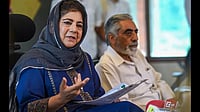The government on Saturday imposed port restrictions on the import of certain goods, such as readymade garments and processed food items, from Bangladesh, in response to similar curbs placed by Dhaka on certain Indian products last month.
This comes at a time when India stopped trade with neighbouring country Pakistan over the Pahalgam terror attack on April 22.
The relations between India and Bangladesh has also been vulnerable since 2024 over alleged attack on Hindu minorities in the foreign land and controversial remarks made by Mohammed Yunus. India had previously withdrawn the transhipment facility it had granted to Bangladesh for exporting various items to the Middle East, Europe and various other countries except Nepal and Bhutan.
Directorate General of Foreign Trade Issues Statement
According to a notification of the Directorate General of Foreign Trade (DGFT), these port restrictions will not apply to Bangladeshi goods transiting through India but destined for Nepal and Bhutan, it added.
The notification imposes "port restrictions on the import of certain goods such as readymade garments, processed food items etc., from Bangladesh to India," the ministry said. The order said that readymade garments imports from Bangladesh will not be allowed from any land port. However, it is allowed only through Nhava Sheva and Kolkata seaports.
For fruits; fruit flavoured and carbonated drinks; processed food items (baked goods, snacks, chips and confectionary); cotton and cotton yarn waste; plastic and PVC finished goods, dyes, plasticisers and granules; and wooden furniture, the notification said the inbound shipments from the neighbouring country shall not be allowed through any LCSs (Land Customs Stations) and ICPs (Integrated Check Posts) in Assam, Meghalaya, Tripura and Mizoram; and LCS Changrabandha and Fulbari, in West Bengal.
It also said that these port restrictions do not apply to the import of Fish, LPG, Edible Oil, and Crushed stone from Bangladesh.
To make these changes, a new paragraph is introduced in the country's import policy regulating the imports of these goods from Bangladesh to India, "with immediate effect," it said.
Background
On April 9, India withdrew the transhipment facility it had granted to Bangladesh for exporting various items to the Middle East, Europe and various other countries except Nepal and Bhutan.
It was announced against the backdrop of the controversial statement made by the head of Bangladesh's interim government Muhammad Yunus in China recently that India's seven northeastern states, which share a nearly 1,600 km border with Bangladesh, are landlocked and have no way to reach the ocean except through his country.
The comments did not go down well in New Delhi. It also drew sharp reactions from political leaders in India across party lines.
Indian exporters, mainly from the apparel sector, had also earlier urged the government to withdraw this facility to the neighbouring country.
India-Bangladesh relations have nosedived dramatically after Yunus failed to contain attacks on minorities, especially Hindus, in that country.
Bangladesh is a big competitor of India in the textile sector. The India-Bangladesh trade stood at USD 12.9 billion in 2023-24.
According to PTI, India had previously permitted Bangladesh exports via all LCSs and ICP and seaports without undue restrictions. However, the neighbouring country imposed port curbs on Indian exports, particularly at LCSs and ICPs bordering northeast states.
On April 13 this year, yarn exports from India across landports were stopped and Indian shipments were subjected to rigorous inspections on entry.
Similarly, due to landport curbs by Bangladesh, the northeastern states suffer from a lack of access to the Bangladesh market to sell locally manufactured goods, restricting the market access to primary agri goods only.
The neighbouring country, on the other hand, has free access to the entire northeast market. The official also said that the list of goods in the notification will be reviewed periodically to ensure that fair and equitable growth is facilitated in the respective NE states.
Bangladesh has also recently imposed curbs on export of Indian yarn via land ports allowing Indian yarns only through seaports.
Bangladesh exports over USD 700 million worth of readymade garments annually to India, PTI reported.






















